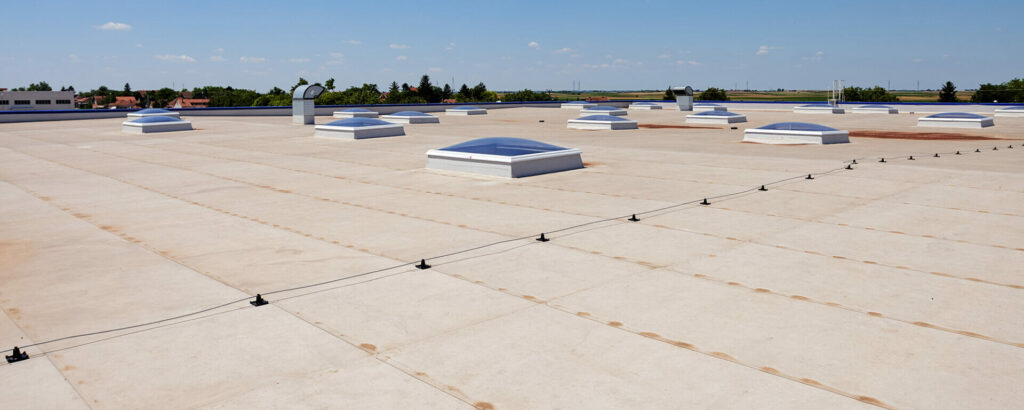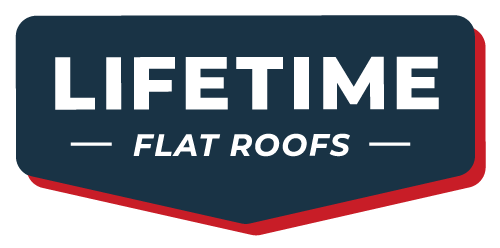As a commercial property owner in Seattle, selecting the right roofing system is essential to withstand the city’s unique climate. From frequent rain to temperature swings, Seattle weather demands a durable, well-chosen roofing solution. Here, we’ll go over the most popular options for commercial flat roofs in Seattle, WA, so you can make an informed decision tailored to your needs. At Lifetime Flat Roofs, we specialize in service in Seattle and provide the expertise to help you find a system that fits your property’s demands.
Understanding Seattle’s Commercial Roofing Needs

Seattle’s weather poses several challenges for flat roofing, with moisture resistance, energy efficiency, and durability being top concerns. The city averages 152 rainy days per year, making it essential to choose a roof that can handle constant moisture exposure. Flat roofing systems also need to be low-maintenance and cost-effective to suit the budget and operational needs of commercial properties.
Factors for Seattle Flat Roofing
- Moisture Resistance: Roofing materials should prevent leaks and withstand water pooling.
- Energy Efficiency: Proper insulation and reflective surfaces help reduce energy costs.
- Durability: Choose materials that endure extreme weather changes without damage.
- Maintenance: The roofing system should be easy to maintain with minimal repairs.
Let’s look at the most common flat roofing types and how they meet Seattle’s unique demands.
Built-Up Roofing (BUR)
Built-Up Roofing (BUR), one of the oldest flat roofing systems, is composed of multiple layers of bitumen and fabric reinforcement. This robust system is popular in commercial roofing due to its strength and durability.
Advantages of BUR
- Strong waterproofing capabilities
- High durability, especially with foot traffic
- Good fire resistance
- Low maintenance requirements
How BUR Performs in Seattle
BUR systems are suitable for Seattle’s rainy climate, though adding a reflective coating can improve energy efficiency by reducing heat absorption. However, BUR roofs can be heavy, so ensure your building’s structure can handle the load.
Modified Bitumen
Modified Bitumen roofing improves on the traditional BUR design by incorporating polymer-modified bitumen. This material provides flexibility, making it highly adaptable to different climates.
Benefits of Modified Bitumen
- Resilient to punctures and tears
- Accommodates building movement, which is ideal for weather shifts
- Available in torch-down and cold-applied varieties
- Adaptable to various installation conditions
Performance in Seattle’s Climate
Modified Bitumen is well-suited for Seattle’s rainy weather and temperature fluctuations. Its flexibility allows it to handle Seattle’s temperature shifts without cracking, while its multi-layer design provides excellent insulation.
Ethylene Propylene Diene Monomer (EPDM)
Ethylene Propylene Diene Monomer (EPDM) is a synthetic rubber roofing material known for its resistance to the elements and long lifespan. Often available in black or white, EPDM has become popular for its affordability and ease of maintenance.
Advantages of EPDM Roofing
- Highly resistant to Seattle’s rain and UV rays
- Long lifespan (up to 30 years or more)
- Easy to repair and maintain
- Excellent flexibility
Suitability for Seattle
EPDM works well for Seattle’s climate due to its weather resistance and flexibility. However, black EPDM can absorb heat, potentially increasing cooling costs in warmer months. Choosing a white EPDM membrane can improve energy efficiency by reflecting sunlight and reducing heat absorption.
Thermoplastic Polyolefin (TPO)
Thermoplastic Polyolefin (TPO) is a single-ply roofing material valued for its energy efficiency and durable performance. With its reflective surface, TPO is a popular choice for property owners seeking both savings on energy bills and long-lasting protection.
Benefits of TPO Roofing
- Reflective surface helps reduce cooling costs
- Resistant to UV rays and chemicals
- Heat-welded seams provide waterproof protection
- Generally more affordable than other single-ply options
Effectiveness in Seattle’s Climate
TPO’s waterproof seams and energy-efficient properties make it well-suited for Seattle’s climate. However, quality varies between TPO manufacturers, so choosing a reputable brand is essential to ensure optimal performance.
Polyvinyl Chloride (PVC)
Polyvinyl Chloride (PVC) is another single-ply membrane known for its resistance to chemicals, UV rays, and punctures. PVC is durable and often used in environments that require added resilience, such as buildings with rooftop equipment or exposure to chemicals.
Advantages of PVC Roofing
- Excellent chemical resistance
- High durability against punctures and wear
- Reflective surface for better energy efficiency
- Fully recyclable
PVC for Seattle’s Conditions
PVC is a top choice for commercial properties in Seattle, especially those near industrial areas or facilities with rooftop equipment. Its energy efficiency also makes it beneficial for Seattle’s climate, helping to reduce energy costs throughout the year.
Metal Roofing
Metal roofing is a popular choice for commercial properties due to its durability, energy efficiency, and long lifespan. Made from materials such as steel, aluminum, and copper, metal roofs provide a strong barrier against the elements and can often last several decades with minimal maintenance. Metal roofing is also highly resistant to Seattle’s wet weather, making it a great option for commercial properties in the region.
Benefits of Metal Roofing
- Metal roofing stands up well to wind, rain, and extreme weather conditions.
- Reflective coatings reduce heat absorption, helping to keep buildings cool in summer.
- Resistant to mold, mildew, and other damage common in wet climates.
- With proper care, metal roofs can last 40–70 years, significantly outlasting many other roofing types.
Suitability for Seattle’s Climate
Seattle’s frequent rain and occasional snow make metal roofing an ideal choice due to its water resistance and ability to shed precipitation quickly. Additionally, metal roofs can be treated with anti-corrosion coatings to prevent rusting. For businesses seeking an eco-friendly option, metal roofs are often made from recyclable materials and can be recycled at the end of their lifespan, aligning with sustainability goals supported by agencies like the U.S. Department of Energy.
Choosing the Best Commercial Flat Roof for Your Building

When comparing commercial roofing types in Seattle, several factors come into play:
- Structural Capacity: Ensure your building can support the chosen roof system.
- Energy Efficiency Goals: Certain roofing types, like TPO and PVC, are more energy-efficient.
- Budget: Consider both initial installation costs and long-term maintenance expenses.
- Maintenance Needs: Choose a roof that balances durability with manageable upkeep.
- Local Codes and Permits: Compliance with Seattle’s building codes and regulations is essential.
At Lifetime Flat Roofs, we help Seattle property owners navigate these factors to find the ideal flat roofing solution. With expertise in Seattle’s unique climate, we provide commercial flat roof installations that combine durability, cost-effectiveness, and energy efficiency.
Ready to Find the Perfect Roof? Schedule a Schedule a Free Inspection Today!
Choosing the right roofing system is a critical investment, and having a knowledgeable partner makes all the difference. At Lifetime Flat Roofs, we’re committed to helping Seattle businesses find roofing solutions that protect and enhance their buildings. Contact us to get a free inspection now and let our experts assess the best options for your commercial property.

